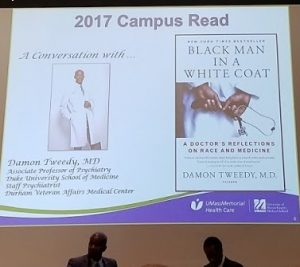Oct
30

Posted by Susan Halpin on October 30th, 2017
Posted in: Blog, NLM, NLM Resources, Public Health
Tags: health disparities, Public Health

With the goal of promoting reflection and academic discourse, the University of Massachusetts Medical School selects a book for the campus to read and discuss each year. A dedicated committee spends precious time reading and reviewing each book nominated. Shedding light on a timely topic, and promoting greater understanding of a key initiative from the school’s mission are two of the criteria a book must meet. Black Man in a White Coat, this year’s campus read, is Dr. Damon Tweedy’s thoughtful compilation of personal and professional stories that clearly illustrate how skin color along with a variety of complex social, cultural and economic factors contribute to inequalities in the health care we receive.
On October 11th, Dr. Damon Tweedy came to the University of Massachusetts Medical School in Worcester, MA for lunch… and a discussion of his book. One of the first stories from the book that Dr. Tweedy shared was his internal struggle with self-doubt in the first months of medical school caused by his of his own insecurity with his skin color, and social class. Just as he was facing those doubts his medical school professor mistakenly identified him as a building custodian and asked him to fix the lights in the classroom. That incident pushed Tweedy to study hard in order to lead the class academically, and to make sure everyone, instructors and peers alike, would have no doubt he “belonged” at Duke Medical School. That first semester of medical school he earned honors status which affirmed to him that he was able to compete academically with classmates who had opportunities to attend expensive and prestigious schools, that he did not.
I was impressed with the vulnerability and honesty with which Tweedy recounts the prejudice he experienced when patients voiced their distrust of him and told him they wanted another doctor for no other reason but his skin color. As I progressed through the book, I felt like a cheerleader hoping Dr. Tweedy would win over another one of these “prejudiced” patients with his compassion, empathy and humility. Showing us himself, being unafraid to include the good, the bad and even the ugly experiences where he reveals his own imperfections, (like when Tweedy has to confront his own prejudice and bias toward others) has given me an additional perspective on the difficult job medical care givers have at times.
Given the media exposure the topic of U.S. Healthcare has had recently, I am a more informed citizen about the complexity that fixing health disparities requires, thanks to what I learned from reading this book and the discussion I was fortunate to be part of! That’s the great thing about reading a good book, you learn about things!
Health disparities refers to differences in the health status of different groups of people. Some groups of people have higher rates of certain diseases, and more deaths and suffering from them, compared to others. These groups may be based on race, ethnicity, immigrant status, disability, sex or gender, sexual orientation, geography or income. As part of its mission to bring good health information to all, The National Library of Medicine seeks to lessen health disparities through its outreach program of free digital resources, training and grant funding opportunities.
In a recent edition (May 16, 2017) of NLM Musings from the Mezzanine, a guest post written by Dr. Fred Wood the Outreach and Evaluation Scientist in the Office of Health Information Programs Development, discusses how the National Institute of Health’s (NIH) All of us precision medicine initiative is expected to focus on the use of big data to help with reducing health disparities. The full article is here, https://nlmdirector.nlm.nih.gov/2017/05/16/health-disparities-big-data/.
If this topic is interests you, there is more information on the MedlinePlus website. There are many useful links to a variety of research and populations affected by health disparities https://medlineplus.gov/healthdisparities.html.